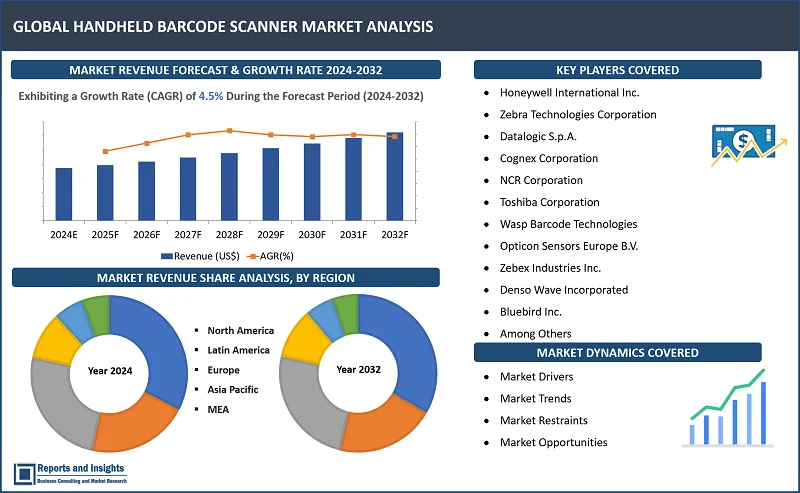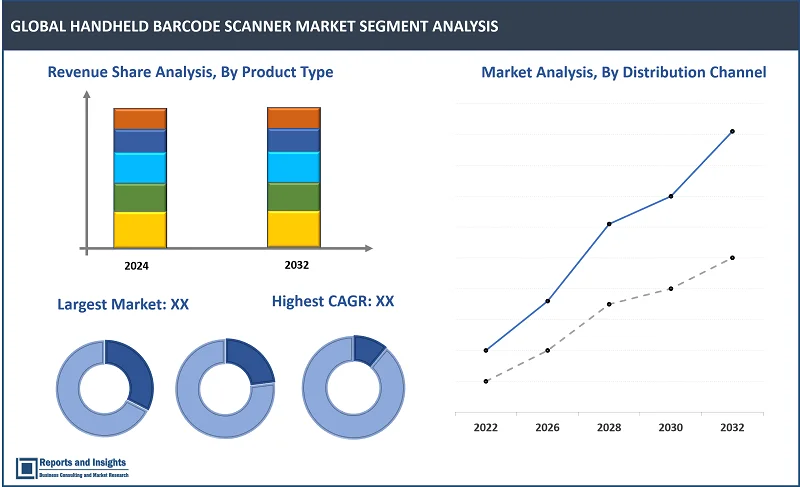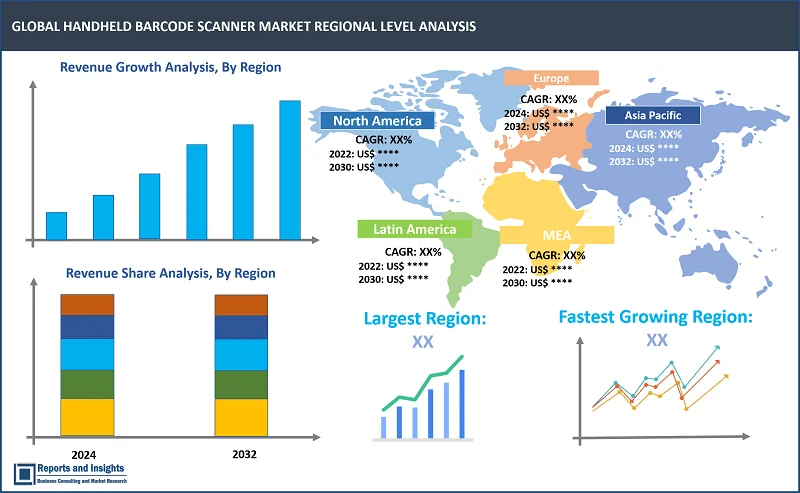Market Overview:
"The handheld barcode scanner market size reached US$ 1,506.5 million in 2023. Looking forward, Reports and Insights expects the market to reach US$ 2,238.8 million in 2032, exhibiting a growth rate (CAGR) of 4.5% during 2024-2032."
|
Report Attributes |
Details |
|
Base Year |
2023 |
|
Forecast Years |
2024-2032 |
|
Historical Years |
2021-2023 |
|
Market Growth Rate (2024-2032) |
4.5% |
The global handheld barcode scanner market is registering a significantly rapid revenue growth due to increasing demand for efficient and accurate data capture solutions across various industries. Market revenue growth is also driven by factors such as growing e-commerce sector, rising adoption of barcode scanning technology in retail and healthcare, and advancements in wireless communication technologies.
The rapid trend of digitalization and automation in inventory management and supply chain operations is also contributing significantly to market revenue growth. However, the market faces challenges such as the availability of alternative data capture technologies and the high cost of advanced handheld barcode scanners.

Handheld Barcode Scanner Market Trends & Drivers:
Increasing Adoption of E-commerce: The rise of e-commerce platforms and online shopping has led to a higher handheld barcode scanners demand. These devices are essential for inventory management, order fulfillment, and tracking products, driving the growth of the market.
Growing Retail Sector: The retail industry is increasingly adopting handheld barcode scanners to streamline point-of-sale processes and enhance inventory accuracy. The trend of omnichannel retailing and the need for real-time inventory visibility have fueled the demand for handheld barcode scanners in retail applications.
Advancements in Technology: Technological advancements in handheld barcode scanners, such as integration of wireless connectivity options including Bluetooth and Wi-Fi are driving market revenue growth. These advancements improve efficiency, convenience, and data accuracy, thereby driving market growth.
Increasing Focus on Healthcare Applications: Adoption of handheld barcode scanners across the healthcare sector for patient identification, medication-related details and administration, and inventory management has been increasing substantially in recent times. The need for error-free medication administration and accurate patient identification has led to increased adoption of handheld barcode scanners in healthcare settings, and the trend is expected to continue.
Rising Demand for Mobile and Wireless Solutions: There is an expanding trend towards mobile and wireless solutions in various industries. Handheld barcode scanners offer the flexibility of mobility and wireless connectivity, enabling users to scan barcodes remotely and access real-time data. This trend is expected to drive the handheld barcode scanners market growth.
Handheld Barcode Scanner Market Restraining Factors:
High Initial Investment: The cost of handheld barcode scanners, especially those equipped with advanced features and technologies, can be relatively high. This can pose a challenge for small and medium-sized businesses with limited budgets, hindering their adoption of handheld barcode scanner solutions.
Integration Challenges: Integrating handheld barcode scanners with existing systems, such as inventory management software or point-of-sale systems, can be complex and time-consuming. Compatibility issues and the need for technical expertise may create barriers to adoption for some businesses.
Limited Durability and Battery Life: Some handheld barcode scanners may have limitations in terms of durability and battery life. Continuous and heavy usage in demanding environments, such as warehouses or manufacturing facilities, may result in frequent replacements or interruptions in operations.
Competition from Mobile Devices: The increasing capabilities of smartphones and mobile devices, such as built-in barcode scanning apps, have presented an alternative to dedicated handheld barcode scanners. This competition from mobile devices can impact the demand for standalone handheld scanners in certain market segments.
Data Security Concerns: Handheld barcode scanners are used to capture sensitive information, including product details, customer data, and inventory records. Data security and privacy concerns, such as potential data breaches or unauthorized access to scanned data, can be a barrier to adoption for organizations that prioritize data protection.
Handheld Barcode Scanner Market Opportunities:
Growing E-commerce Industry: Rapid growth of the e-commerce industry presents significant opportunities for handheld barcode scanner market players. With the increasing number of online orders and shipments, there is a higher demand for efficient inventory management and order processing, driving the need for handheld barcode scanners in warehouses and fulfillment centers.
Expansion of Retail Sector: The retail sector, including supermarkets, convenience stores, and specialty retailers, continues to expand globally. Handheld barcode scanners play a crucial role in streamlining checkout processes, inventory management, and price verification, offering opportunities for market players to cater to the evolving needs of retailers.
Industrial Automation and IoT Integration: The integration of handheld barcode scanners with industrial automation systems and Internet of Things (IoT) technologies opens up new avenues for market growth. The ability to capture barcode data and transmit it in real-time to connected systems enhances operational efficiency, inventory accuracy, and supply chain visibility.
Healthcare and Pharmaceutical Applications: The healthcare and pharmaceutical sectors require accurate and efficient tracking of medications, medical devices, and patient information. Handheld barcode scanners enable healthcare professionals to easily scan and verify barcodes on medication packaging, patient wristbands, and medical equipment, improving patient safety and reducing medication errors.
Emerging Markets: Emerging markets, particularly in Asia Pacific and Latin America, present untapped opportunities for handheld barcode scanner market players. The rising adoption of barcode technology in retail, logistics, and manufacturing sectors in these regions, coupled with the growth of organized retail and e-commerce, creates a favorable market landscape for handheld barcode scanner solutions.
Handheld Barcode Scanner Market Segmentation:

By Product Type:
- Laser Barcode Scanners
- Linear Imager Barcode Scanners
- 2D Imager Barcode Scanners
- CCD Barcode Scanners
By Technology:
- Corded Barcode Scanners
- Cordless Barcode Scanners
By Industry Vertical:
- Retail and E-commerce
- Healthcare
- Manufacturing and Industrial
- Transportation and Logistics
- Hospitality and Entertainment
- Others
By Distribution Channel:
- Online Retail
- Offline Retail
By Region:

- North America
- Latin America
- Asia Pacific
- Europe
- Middle East & Africa
North America is one of the leading regions in the handheld barcode scanner market. The high adoption of advanced technologies, such as automation and IoT, across various industries drives the demand for handheld barcode scanners. The retail and logistics sectors in the region have a strong preference for handheld barcode scanners to enhance operational efficiency and improve customer experience. The presence of major market players and technological advancements contribute to the growth of the handheld barcode scanner market in North America.
Europe showcases a significant demand for handheld barcode scanners due to the thriving retail and manufacturing sectors. Countries like Germany, the UK, and France have a robust supply chain infrastructure and a large number of retail stores, driving the need for efficient inventory management and product tracking. Additionally, the implementation of strict regulations regarding product traceability and safety further boosts the adoption of handheld barcode scanners in the region.
Asia Pacific is a rapidly growing market for handheld barcode scanners. The region's expanding retail sector, particularly in countries like China, India, and Japan, fuels the demand for barcode scanners for inventory management, point-of-sale operations, and supply chain optimization. The increasing adoption of e-commerce and the growth of the manufacturing industry also contribute to the demand for handheld barcode scanners in Asia Pacific.
Leading Handheld Barcode Scanner Providers & Competitive Landscape:
The handheld barcode scanner market is highly competitive with the presence of several key players operating on a global scale. These companies focus on continuous innovation and product development to gain a competitive edge. They also engage in strategic partnerships, collaborations, and acquisitions to expand their market reach and strengthen their product portfolio. These companies strive to offer advanced features, reliable performance, and seamless integration capabilities to cater to the diverse needs of industries such as retail, logistics, healthcare, and manufacturing.
Company List:
- Honeywell International Inc.
- Zebra Technologies Corporation
- Datalogic S.p.A.
- Cognex Corporation
- NCR Corporation
- Toshiba Corporation
- Wasp Barcode Technologies
- Opticon Sensors Europe B.V.
- Zebex Industries Inc.
- Denso Wave Incorporated
- Bluebird Inc.
- Motorola Solutions, Inc.
- Newland EMEA
- CipherLab Co., Ltd.
- Unitech Electronics Co., Ltd.
Research Scope
|
Report Metric |
Report Details |
|
Market size available for the years |
2021-2032 |
|
Base Year |
2023 |
|
Forecast Period |
2024-2032 |
|
Compound Annual Growth Rate (CAGR) |
4.5% |
|
Segment covered |
Product Type, Technology, Industry Vertical, Distribution Channel and Region |
|
Regions Covered |
North America: The U.S. & Canada Latin America: Brazil, Mexico, Argentina, & Rest of Latin America Asia Pacific: China, India, Japan, Australia & New Zealand, ASEAN, & Rest of Asia Pacific Europe: Germany, The U.K., France, Spain, Italy, Russia, Poland, BENELUX, NORDIC, & Rest of Europe The Middle East & Africa: Saudi Arabia, United Arab Emirates, South Africa, Egypt, Israel, and Rest of MEA |
|
Fastest Growing Country in Europe |
Germany |
|
Largest Market in Asia Pacific |
China |
|
Key Players |
Honeywell International Inc., Zebra Technologies Corporation, Datalogic S.p.A., Cognex Corporation, NCR Corporation, Toshiba Corporation, Wasp Barcode Technologies, Opticon Sensors Europe B.V., Zebex Industries Inc., Denso Wave Incorporated, Bluebird Inc., Motorola Solutions, Inc., Newland EMEA, CipherLab Co., Ltd. and Unitech Electronics Co., Ltd. amongst others. |
Frequently Asked Question
What is the expected growth rate of the global handheld barcode scanner market?
The global handheld barcode scanner market is expected to register a CAGR of 4.45% during the forecast period.
What was the global handheld barcode scanner market size in 2023?
The global handheld barcode scanner market size in 2023 was US$ 1,506.5 Million.
What are some driving factors behind growth of the global handheld barcode scanner market?
Increasing adoption of barcode scanning technology in various industries, growing e-commerce and retail sectors,and rising need for inventory management and tracking.
What are some major restraints affecting the revenue growth of the global handheld barcode scanner market?
High initial costs of handheld barcode scanners, availability of alternative technologies, and concerns regarding data security and privacy.
What are some of the opportunities in the global handheld barcode scanner market?
Integration of handheld barcode scanners with mobile devices, increasing demand from emerging economies, and the development of advanced features and functionalities.

